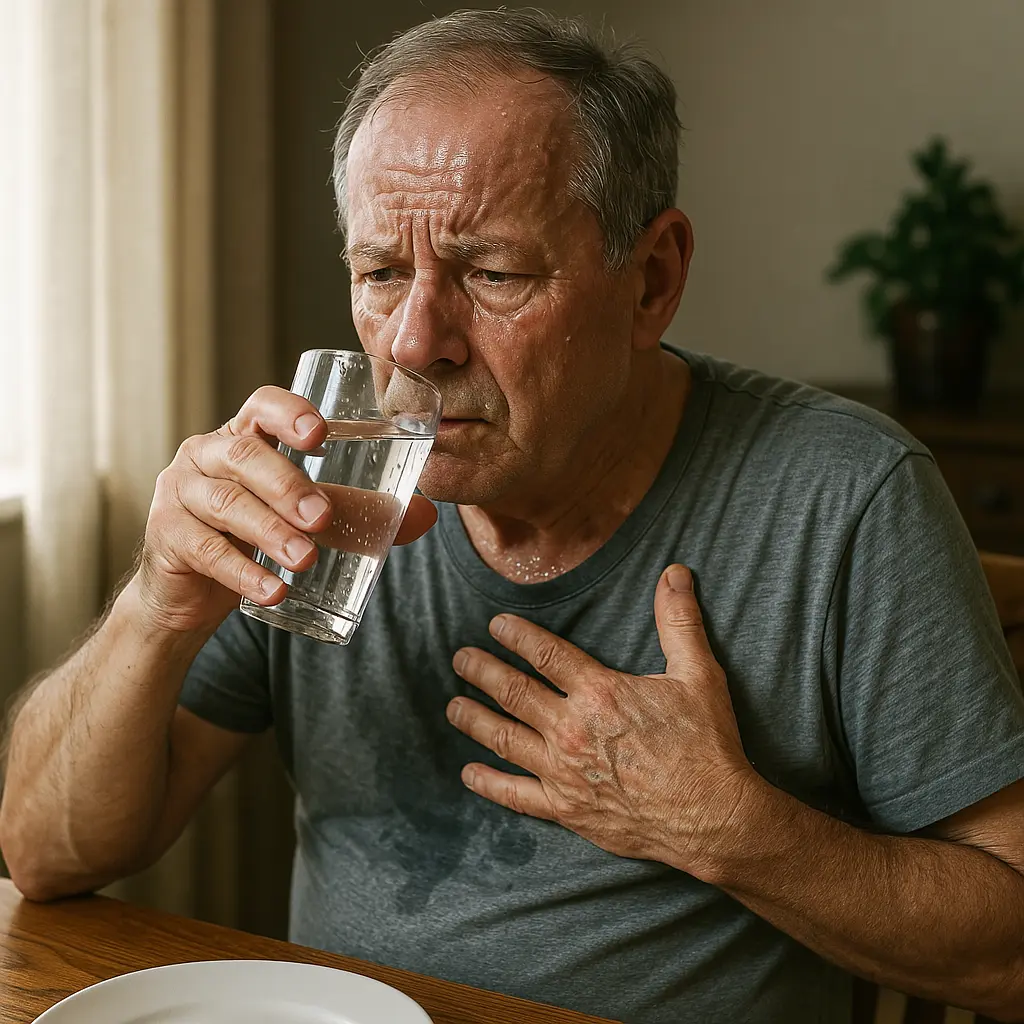One of the most common questions I get during my health talks is: What should we do at home if someone is having a heart attack? Are there any effective home remedies? Some people mention ginger, garlic, and other natural options, but are they really helpful?
I mostly answer, if someone suspects a heart attack (myocardial infarction), immediate medical attention is critical. However, specific at-home actions can be life-saving in those first crucial moments before reaching the hospital.
First: Recognize the Symptoms
Common signs of a heart attack include:
- Chest pain or pressure (tightness, heaviness, or squeezing sensation)
- Pain radiating to the left arm, neck, jaw, and back
- Associated with shortness of breath
- Cold sweat
- Nausea or vomiting
- Lightheadedness or fainting
What to Do at Home (Before Ambulance or Hospital Arrival)
Call Emergency Services/Ambulance Immediately
- Dial the emergency number (like 108 in India, 911 in the US) without delay.
- Do not drive yourself unless there is no other choice.
Chew a 300 mg Aspirin Tablet (if not allergic)
- If an already known case of CAD or a Doctor has advised previously, one can chew (not swallow) one 300 mg uncoated aspirin or four 75 mg tablets.
- Aspirin helps thin the blood and prevents further clot formation.
- Do not give aspirin if the person has active bleeding, peptic ulcer, or an allergy to aspirin.
Stay Calm and Rest in a Comfortable Position
- Sit or lie in a semi-reclining position (propped up position), with head and shoulders slightly raised.
- Avoid walking or any physical effort — rest conserves oxygen.
If Prescribed Nitroglycerin (for known heart disease)
- Take sublingual nitroglycerin (sorbitrate 5 mg tablet under the tongue) if previously advised by the doctor.
- It can be repeated every 5 minutes for up to 3 doses unless blood pressure drops or symptoms improve.
- Do NOT take if systolic BP <90 mmHg
Monitor the Patient
- Monitor BP and Pulse at home. Be ready to start CPR if the person becomes unresponsive and not breathing. (Learn CPR)
Avoid These Myths / Unsafe Home Remedies
- No lemon juice, ginger, garlic, turmeric, or herbal drinks.
- Do not ignore symptoms, hoping it’s gas or acidity.
These home remedies are often falsely believed to “cure” or “stop” heart attacks, but here’s why they should be avoided in an emergency:
1. Garlic
- Myth: “Garlic thins the blood, so it can help during a heart attack.”
- Reality: Garlic does not act quickly enough to prevent clot progression during an acute coronary event.
- It has some mild antiplatelet and modest BP-lowering effects in long-term use (due to allicin in garlic), but is not useful in acute MI.
- The dose is unpredictable
- No proven benefit in acute MI
2. Turmeric
- Myth: “Anti-inflammatory, protects the heart.”
- Reality:
- Turmeric (curcumin) is anti-inflammatory in chronic settings, not in acute thrombotic events
- No evidence that it improves outcomes in myocardial infarction
3. Ginger
Potential Long-Term Cardiovascular Effects
- Anti-inflammatory and antioxidant actions
- May modestly lower blood pressure and cholesterol
- Some studies suggest it may enhance nitric oxide bioavailability, improving vasodilation
- Has antiplatelet activity (gingerol components), but weaker and slower than aspirin
- BUT: Not Useful in an Acute Heart Attack
- Even if ginger has some beneficial vascular effects long-term, it is not helpful in the acute setting of myocardial infarction. Ginger’s effects are mild and gradual, not fast enough to counter an active coronary thrombus.
- There is no standardized preparation/dose with immediate clinical benefit. Any NO effect is mild and non-sustained — can’t reverse coronary spasm or occlusion.
All these so-called home remedies (ginger, garlic, turmeric, etc.) are beneficial in long-term use, not in the acute setting. One should not delay the actual treatment, considering these home remedies to be effective as claimed.
Conclusion: Time is the main key
- Golden Hour: The earlier the treatment of a heart attack, the better the chances of survival and reduced heart damage. (coronary interventions)
- Clot-busting medicines(thrombolysis) or angioplasty are most effective if done within 1–2 hours of symptom onset.
Citations:
- https://www.healthline.com/health/how-to-stop-a-heart-attack#prevention
- https://www.jhah.com/en/news-events/news-articles/survive-a-heart-attack-when-alone
- https://www.webmd.com/heart-disease/heart-attack-symptoms-emergency
- https://academicjournals.org/journal/IJMMS/article-full-text-pdf/F49ACB050204
- https://pmc.ncbi.nlm.nih.gov/articles/PMC3083808/
- https://medicaldialogues.in/cardiology-ctvs/fact-check-can-chewing-garlic-ginger-and-turmeric-cure-heart-attacks-128037


Leave a Reply